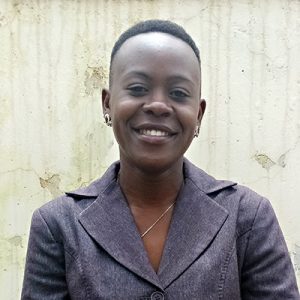A beneficiary of a spring we protected in May 2021 alerted us to the water crisis going on at Mugai Primary School. When we learned of the situation beleaguering the school's 950 students, we knew we had to help.
The well on school grounds has been broken for longer than any of the students or staff can remember. Instead, they have to go next door to the secondary school's standpipe for water. But this isn't as simple as it sounds.
A barbed-wire fence separates the two campuses. But because the fence cannot be taken down for security reasons, students must pass through a gap in the fence instead. The barbs catch on their clothes, hair, and skin.

Then, once they've surpassed this challenge, they are often met with animosity and bullying from the secondary school's students and staff, who would prefer the primary students go elsewhere for water, because there is never enough for both schools.
"Many times, I have to [go] to the secondary section and beg for water before the pupils can be allowed to fetch," said 55-year-old teacher, Kennedy Wekulo. "It's a repetitive thing. The humbling and begging irritates me."
"The intimidation from the high school students at the water point is what irritates me most," said 10-year-old student Francis K. "Missing classes is also another issue, all because I have to fetch water when called upon."
When primary school students come back without any water, they are often punished. It's no wonder that absenteeism is high when the students are being bullied and punished for something out of their control.
What We Can Do:
New Well
We conducted a hydrogeological survey at this school and the results indicated the water table beneath it is an ideal candidate for a borehole well. Due to a borehole well's unique ability to tap into a safe, year-round water column, it will be poised to serve all of the water needs for this school's large population, even through the dry months.
The school will help collect the needed construction materials such as sand, rocks, and water for mixing cement. They will also provide housing and meals for the work team, in addition to providing local laborers. We will complement their materials by providing an expert team of artisans and drilling professionals, tools, hardware, and the hand-pump. Once finished, water from the well will then be used by the school’s students and staff for drinking, handwashing, cooking, cleaning, and much more.
Handwashing Stations
There is currently nowhere for students to wash their hands after using the latrines or before eating lunch, let alone the water to do so.
The student health club will oversee the two new handwashing stations we will provide, and make sure they are kept clean and in working condition. The club leaders will fill the handwashing stations with water daily and make sure they are always supplied with a cleaning agent such as soap or ash.
VIP Latrines
We will construct two triple-door latrine blocks using local materials that the school will help gather. Three doors will serve the girls and three doors will serve the boys. All of these new latrines will have cement floors that are designed to be easy to use and to clean. And with a borehole right on school property, there should be enough water to keep them clean.
Training on Health, Hygiene, COVID-19, and More
We will hold a one-day intensive training session with students, teachers, and parents. This training will cover a wide range of topics including COVID-19 symptoms, transmission routes, and prevention; personal and environmental hygiene; and the operation and maintenance of the borehole, latrines, and handwashing stations. There will be a special emphasis on handwashing.
Our team of facilitators will use a variety of methods to train, including participatory hygiene and sanitation transformation, and asset-based community development. We will initiate a student health club, which will prepare students to lead other pupils into healthy habits at school and at home. We will also lead lectures, group discussions, and provide illustrative handouts to teach health topics and ways to promote good hygiene practices within the school including handwashing and water treatment. We will then conduct a series of follow-up trainings before transitioning to our regularly scheduled support visits throughout the year.
We and the school strongly believe that all of these components will work together to improve standards at this school, which will help lead to better student academic performance and will help unlock the opportunity for these students to live better, healthier lives.

 Borehole Well and Hand Pump
Borehole Well and Hand Pump
 Rehabilitation Project
Rehabilitation Project







































